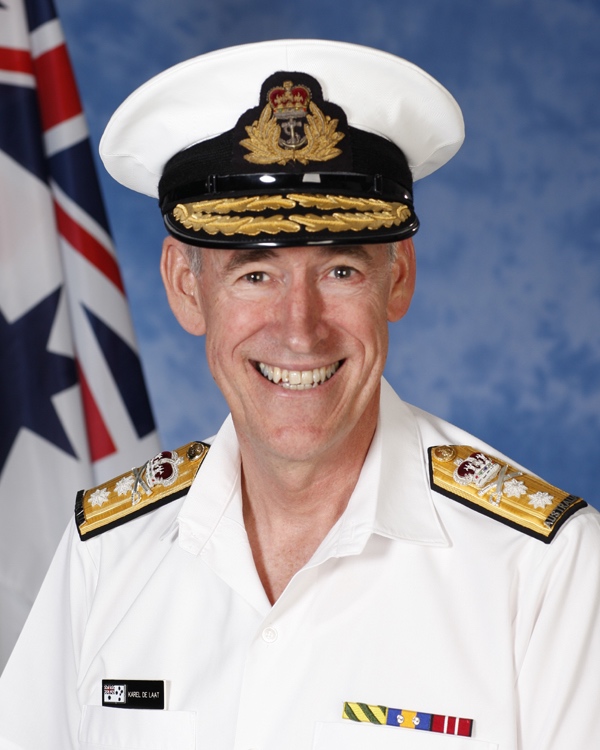Rear Admiral Frans Karel de Laat

Frans Karel de Laat, known as Karel, was born on 23 December 1949 in Rotterdam, The Netherlands. He migrated to Queensland, Australia with his family in June 1953 and subsequently became an Australian citizen in March 1962. He was interested in a military career from a young age, joining the Australian Army Cadets at age 14 and ultimately became a company commander in his final year of high school and was awarded prizes for being the most efficient cadet and having the most efficient platoon.
Upon leaving school he commenced studying psychology at the University of Queensland and also joined the Citizens Military Forces (Army Reserve) serving in 21 Psychology Unit, as a psychological assessor, during 1967-1969. He was awarded a Commonwealth scholarship to complete his Bachelor of Arts; having completed the majority of his studies on a part-time basis while working in the Australian Public Service. He subsequently completed a Bachelor of Art (University of Queensland) in 1971 and a Diploma in Psychology (University of Queensland) in 1973.
After completing his Diploma in Psychology, de Laat qualified as a psychologist while employed by the University of Queensland in a training role and became a Member of the Australian Psychological Society. While working at the University he was appointed as a part-time consultant psychologist to the Royal Australian Navy (RAN) as part of its Queensland recruiting team, serving in this role as a civilian during 1976 - 1978. In 1978, the RAN established a reserve psychological branch and a special list of psychology officers. On 20 November 1978, de Laat was appointed as a Lieutenant in the Royal Australian Naval Reserve (RANR) in support of the Brisbane Port Division and the RAN recruiting team.
From 1978 to 1990 he was attached to the Brisbane Port Division of the RANR based at HMAS Moreton and also completing short term postings to Navy Office, Canberra and in support of other bases including HMA Ships Cairns and Encounter. His initial duties were in his psychology specialisation, but after promotion to Lieutenant Commander, in 1986, he was appointed as a head of department and in charge of recruiting, recruit training, psychology and public relations (for the Brisbane based landing craft HMAS Labuan. He also continued his academic career obtaining a Master of Letters from the University of New England (Armidale, NSW) in 1979.
After a restructure of the RANR and the closure of the Brisbane Port Division, Lieutenant Commander de Laat served in the Directorate of Naval Psychology, based in Canberra, and consulted to the Directorate of Naval Officers Postings (DNOP) from 1991 to 1995. As a consultant, he coordinated the RAN Officer Career Management Survey and provided strategic planning advice to DNOP for which he was awarded an Australia Day Medallion. He was promoted Commander on 1 July 1995 and subsequently served as the national Senior Naval Reserve Psychologist during 1995-1996.
In 1997, Commander de Laat was appointed Director Reserve Utilisation Policy and chair of the Force Mix Review Board Working Group. As such, he was tasked with developing a structure that would optimise the contribution that the RANR made to the RAN and enhance the overall effectiveness of the 'Total Force' Navy. As part of this process he advocated the utilisation of reserve force members on a 'part-time' basis in essential roles that made them an integral part of the command structure.
On 30 April 1998, de Laat was promoted Captain and appointed as Director General Reserves - Navy (DGRES-N), chair of the Force Mix Review Board and principal reserve advisor to Chief of Navy. During his seven year tenure as DGRES-N he established a comprehensive command structure to progress the introduction of the 'Total Force' and increase the contribution of the RANR to the day to day operations of the Navy. As an ancillary function, he established and managed the Chief of Navy Corporate Consultative Program facilitating senior naval officer engagement with Australian industry and commerce. In addition he committed to do professional work in Navy Office, including working with personnel on board HMA Ships Sydney and Tobruk. He was promoted Commodore on 22 May 2001 and was awarded a Conspicuous Service Cross (CSC) in the 2004 Queen's Birthday Honours List "for outstanding achievement, fine leadership and tireless dedication as Director General Reserves-Navy".
After completing his tenure as DGRES-N, Commodore de Laat was appointed to establish and manage the RAN Community Engagement Strategy. From 2005-2006 he was tasked with raising awareness of the role of the RAN. This was done through a range of events that allowed members of the public to engage with Navy members and learn about day to day activities undertaken by the RAN as well as gaining a better understanding of naval careers.
In 2007, he was appointed as the inaugural Director General Australian Navy Cadets. After completing a comprehensive study ('ANC 2010') he restructured the Australian Naval Cadets into flotillas, rather than as stand alone units, to facilitate both joint activities and better use of resources for sea training. On 17 December 2007, de Laat was promoted Rear Admiral and appointed as Head Cadet Policy and chair of the Cadet Policy Committee in charge of coordinating the delivery of Australian Defence Force cadet programs by the single service cadet commands in Navy, Army and Air Force.
>Rear Admiral Karel de Laat, CSC, RFD, RAN retired from the RAN on 30 June 2009 after more than 30 years of service. After retiring he completed his doctorate in naval history at the University of New South Wales, Canberra, in 2013. His thesis was 'Seamanship and citizenship: a history of the Australian naval and sea cadet movement, 1863-1952'. He continues to consult in organisational psychology and pursues his interests in writing, mentoring and public speaking. On 18 January 2017 the King of the Netherlands appointed him Honorary Consul for Queensland.


